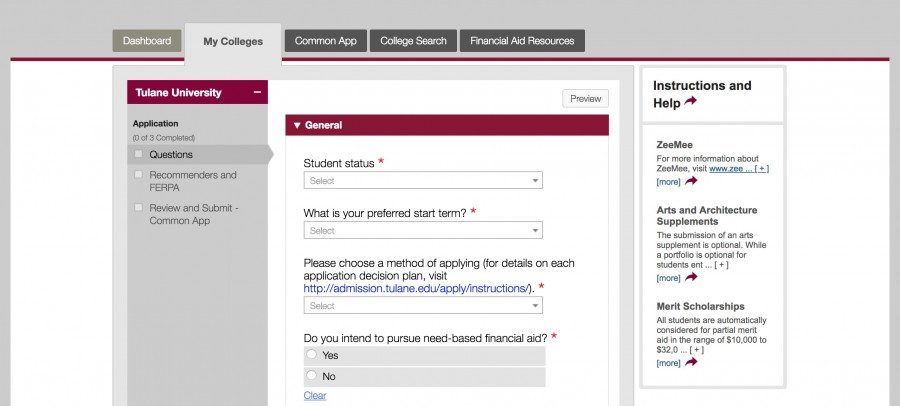USG passes amended “ban the box” resolution
Last week, the Undergraduate Student Government passed legislation calling on Tulane Admission to note that it will disregard past criminal convictions on applications.
The resolution was presented by USG Senator Ella Helmuth last semester after Gov. John Bel Edwards signed the “ban the box” law that applies to all Louisiana public universities and colleges.
Louisiana becomes the 1st state to "ban the box," with help from #Tulane students and the Newcomb Prison Project: https://t.co/FoQfjX1K6W pic.twitter.com/91SxmsPHgY
— Newcomb Institute (@NCITU) July 17, 2017
Helmuth met with Newcomb Prison Project about its initiative to make “ban the box” effective at Tulane. She also talked to Satyajit Dattagupta, vice president for enrollment management and dean of undergraduate admission, before bringing the resolution to USG Senate.
The law prevents admissions teams from asking about criminal history on applications unless they are convictions for stalking, rape or sexual battery.
The legislation was first brought to USG Senate in November but was met with pushback about the lack of research behind the “ban the box” initiative and the potential for the law to negatively impact students of color.
“I had read some research that had claimed that it could actually adversely affect the admissions departments,” Sonali Chadha, director of diversity and inclusive excellence, said.
After Chadha brought up the study, an extensive debate ensued on the Senate floor.
Annie Frietas, founder of the Newcomb Prison Project, and members of the organization spoke out in favor of the legislation. Frietas is a Tulane graduate student and program director of the Louisiana Prison Education Coalition.
Bruce Reilly, a Tulane Law School graduate, was also there in support of the bill. He made national news in 2011 by disclosing that he was convicted of murder when he was accepted to Tulane.
Reilly submitted a letter to the editor to The Hullabaloo in November, disassociating himself from Tulane until the bill passes.
Bruce is right, we need to #BanTheBox at @TulaneNews https://t.co/09xUtmXYBa
— Step Up Louisiana (@StepUpLA) November 20, 2017
After the legislation was tabled at the Senate meeting in the fall, the Diversity and Inclusive Excellence and Student Life Committees met to discuss an amendment to the legislation.
“I really believe in the democratic process of USG, and my intention was not to push anything through that people felt uncomfortable with,” Helmuth said.
The new legislation that was passed last week asks that Tulane Admission more clearly indicate that it will disregard any information regarding previous incarceration or conviction of a felony status when making a decision about admission.
@USGTulane passed a resolution that calls upon @TulaneAdmission to clearly indicate the disregard of past felony convictions on the Tulane Undergraduate Application.
— Hullabaloo News (@hullnewsTU) February 21, 2018
It also encourages the university to provide support services to formerly incarcerated students after they actually get to Tulane.
“… Making sure that they’re getting the support they need to adjust here and thrive because their pre-collegiate experiences aren’t necessarily aligned with that of the average Tulane student if they were formerly incarcerated,” Helmuth said.
Some students, including the Newcomb Prison Project, are still pushing for the passing of the “ban the box” legislation in its entirety, rather than the amended version.
“While we appreciate the gesture that this legislation makes, the new amendment removes all of the impact from the original bill,” Daniel Goldstein, president of Newcomb Prison Project, said. “We will continue to push for substantive change in Tulane’s admissions process so as to increase access to higher education and better the whole community.”
After six months of deliberation, the amended legislation was passed and pushed to Tulane Admission at last Tuesday’s USG Senate meeting.
“It’s a pretty new program, and any time there’s a new program it’s really hard,” Chadha said.
Helmuth said the long process that went into the legislation will all be worth it if even one student comes to that question and doesn’t feel like they will be disregarded in the admission process.
Disclaimer: Ella Helmuth previously served as a Photography Editor for the Hullabaloo.
Editor’s Note: After receiving feedback from the Newcomb Prison Project, we have changed language in this article to be more humanistic toward individuals affected by the justice system. We apologize for the insensitivity.
Your donation will support the student journalists of Tulane University. Your contribution will allow us to purchase equipment and cover our annual website hosting costs.

















Leave a Comment